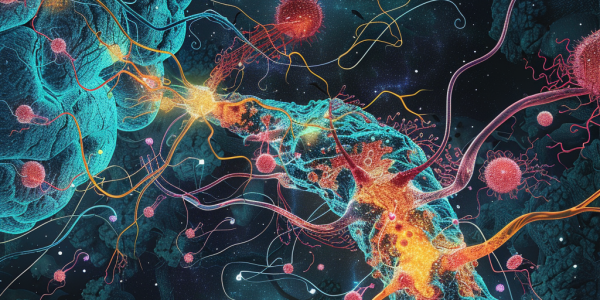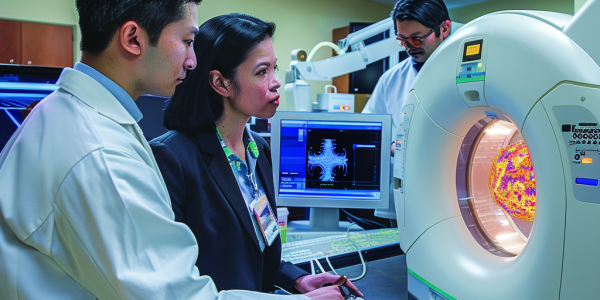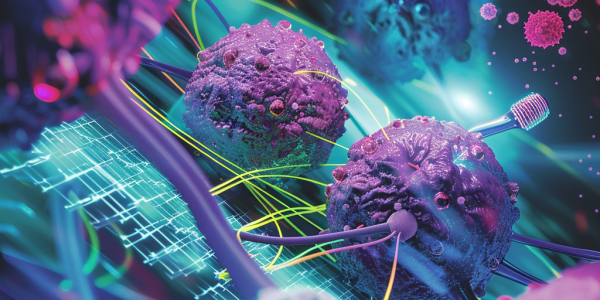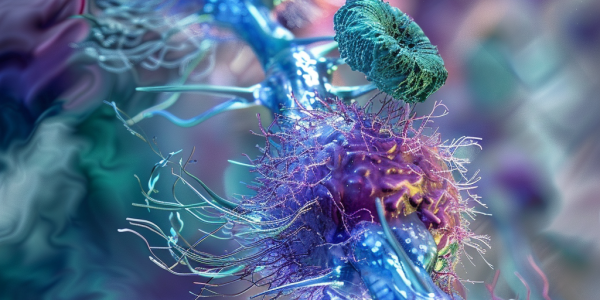New Study Reveals Glioblastoma’s Integration into Brain Circuits
Recent research from Heidelberg University reveals new insights into glioblastoma, highlighting how tumor cells integrate into brain circuits. This groundbreaking study, published in Cell, uncovers the complex interactions between aggressive brain tumors and nerve cells, paving the way for innovative therapies. Led by Dr. Varun Venkataramani, the research utilized modified rabies viruses to track glioblastoma cell behavior, emphasizing the need for ongoing studies to improve treatment outcomes for this challenging brain cancer.
Breakthrough MRI Technology Predicts Ovarian Cancer Treatment Response
A groundbreaking study from the University of Cambridge reveals a revolutionary MRI-based imaging technology, hyperpolarized carbon-13 imaging, that can predict ovarian cancer tumor responses to treatment. This innovative method enhances MRI signals by up to 10,000 times, enabling rapid assessments of treatment effectiveness, distinguishing between tumor subtypes, and personalizing cancer care. With the ability to evaluate responses to chemotherapy within 48 hours, this advancement promises to transform ovarian cancer treatment and improve patient outcomes.
New Algorithm SPRINTER Enhances Understanding of Cancer Cell Proliferation
A groundbreaking study published in Nature Genetics introduces SPRINTER, a novel algorithm that analyzes tumor cell proliferation at a single-cell level. Developed by researchers from the TRACERx and PEACE consortia, SPRINTER enhances our understanding of cancer evolution, particularly in non-small cell lung cancer (NSCLC). This innovative approach leverages single-cell genomics to map the growth rates of genetically distinct tumor clones, paving the way for personalized cancer treatments and improved therapeutic strategies.
New Insights into Cancer Research: The Role of EV-DNA in Antitumor Immunity
In a groundbreaking study published in Nature Cancer, researchers have unveiled the role of extracellular vesicle-derived DNA (EV-DNA) in colorectal cancer metastasis. This research highlights the potential of EV-DNA as a predictive biomarker for postoperative metastasis risk, offering new insights into cancer biology and paving the way for innovative therapeutic strategies.
Rising Pancreatic Cancer Cases Among Youth: A Closer Look at Overdiagnosis
Recent studies indicate a rising incidence of pancreatic cancer among younger individuals in the U.S., yet a new report reveals that most cases are diagnosed early, leading to better outcomes. This challenges the perception of a health crisis, suggesting the need for careful management and screening strategies to balance early detection with the risk of overtreatment.
Breakthrough in Cancer Research: New Tumor Suppression Mechanism Discovered
Scientists at St. Jude Children’s Research Hospital have discovered a novel tumor suppression mechanism involving the protein p14ARF, which interacts with nucleophosmin to inhibit ribosome production and suppress cancer cell growth. This groundbreaking research, published in Nature Communications, reveals how p14ARF’s increased expression in response to oncogenic stress can lead to significant advancements in cancer treatment strategies.
Bella Johnston’s Inspiring Journey: Overcoming Tumor Surgery and Misdiagnosis
Bella Johnston, a 30-year-old woman from Hackney, London, has undergone life-changing surgery to remove a tumor from her throat after years of misdiagnosis. Her journey from a misdiagnosed eating disorder to a complex 10-hour surgery highlights the importance of proper medical diagnosis. Bella’s resilience shines as she adapts to her new life, raising awareness about health advocacy and the power of modern medicine.
Study Highlights Importance of Tertiary Lymphoid Structures in Liver Cancer Treatment
A groundbreaking study from Johns Hopkins Kimmel Cancer Center reveals that tertiary lymphoid structures (TLS) significantly enhance anti-tumor immunity in liver cancer treatment. Published in Nature Immunology, the research indicates that higher densities of TLS correlate with reduced cancer recurrence post-surgery, emphasizing their potential role in improving outcomes for patients undergoing presurgical immunotherapy for hepatocellular carcinoma (HCC).
MIT Researchers Unveil Dual-Action Cancer Therapy Combining Phototherapy and Chemotherapy
MIT researchers have developed a groundbreaking dual-action cancer therapy that combines phototherapy and chemotherapy into a single implant. This innovative approach aims to enhance treatment effectiveness while minimizing side effects for patients with advanced tumors. Early studies show promising results, potentially paving the way for more personalized and effective cancer treatments.
Advancements in Gene and Cell Therapies for Brain Tumors Highlighted at ESGCT 2024
The 31st Annual Congress of the European Society of Gene and Cell Therapy (ESGCT) in Rome highlights groundbreaking advancements in gene and cell therapies for malignant brain tumors. Leading scientists discuss innovative treatment strategies, including personalized gene therapy and CAR T-cell therapy, aimed at improving patient outcomes. With the increasing prevalence of brain tumors, this congress emphasizes the urgent need for effective therapies and collaboration among researchers to accelerate clinical applications.










